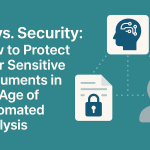Overview
Online data storage represents a transformative approach to managing digital content, allowing for the storage of information on remote servers accessed via the internet. This method offers significant advantages over traditional local storage, including:
- Flexibility
- Scalability
- Cost-effectiveness
As businesses increasingly recognize the critical role of online data storage solutions, they also discover benefits such as:
- Enhanced collaboration
- Improved operational efficiency
- Robust security measures essential for compliance with regulations like GDPR
These factors collectively underscore the pivotal importance of online data storage in modern information management.
Introduction
In a world increasingly reliant on digital solutions, online data storage has emerged as a cornerstone of modern business operations. This innovative approach enables organizations to store and access vast amounts of data remotely, fostering collaboration and enhancing operational efficiency. As the volume of data continues to soar—projected to reach an astonishing 6,800 exabytes by 2025—the demand for secure and scalable storage solutions becomes ever more critical.
Businesses face a multitude of choices, from cloud and hybrid models to private and public storage options, each offering unique benefits tailored to specific needs. However, with these advantages come challenges, particularly in the realms of security and compliance.
This article explores the landscape of online data storage, highlighting its benefits, risks, and best practices for effective management while delving into future trends that promise to shape the industry in the coming years.
Defining Online Data Storage: An Overview
Online data storage signifies a pivotal shift in how digital content is managed, enabling users to keep their data on remote servers accessible via the internet, rather than relying on local devices or physical media. This innovative approach empowers users to upload, manage, and retrieve their data from virtually anywhere with an internet connection. As various technologies evolve, online data storage systems have emerged as a leading solution due to their scalability, flexibility, and cost-effectiveness.
As we look toward 2025, the global data capacity has reached an astounding 6,800 exabytes, a milestone first achieved in 2020, underscoring the increasing reliance on digital solutions across diverse industries. This trend accentuates the critical importance of robust online information preservation systems, particularly in sectors where security and privacy are paramount. Industry leaders assert that effective online information retention not only enhances collaboration but also streamlines operations, ensuring accessibility across multiple platforms and devices.
The advantages of online data storage for businesses are manifold. Companies can significantly boost operational efficiency by facilitating seamless information sharing among teams, regardless of their physical locations. Additionally, real-time access to information fosters improved decision-making and responsiveness to market dynamics.
For instance, the platform utilised by over 10,000 businesses globally exemplifies how online information management can enhance document organisation and client interaction through secure, user-friendly solutions. MyDocSafe provides secure information rooms tailored for M&A, insolvency, and real estate transactions, ensuring sensitive documents are shared safely with all relevant stakeholders. Furthermore, features such as automatic document distribution, reminders, and notifications reduce non-billable time spent onboarding new clients.
As Tara Kachaturoff observed, ‘Its simplicity in handling client agreements’ highlights the practical advantages that online information solutions deliver.
Anticipated growth in the online data storage market in 2025 is driven by increasing information generation and the demand for secure, compliant storage solutions. Businesses are increasingly recognising the value of investing in these technologies, not only for operational efficiency but also for maintaining competitive advantages in a data-driven landscape. The platform sets itself apart by prioritising protection, ease of use, and extensive functionality, which collectively enhance productivity and client satisfaction.
Its customisable portal groups and e-signature capabilities streamline client onboarding and document management processes, making it an ideal choice for legal firms. Moreover, the encryption and protection features ensure that sensitive information is safeguarded, addressing critical issues in information management.
In summary, utilising online data storage provides a strategic advantage for companies seeking to modernise their operations. By leveraging these technologies, organisations can enhance productivity, ensure compliance with regulations like GDPR, and ultimately improve client satisfaction. The significance of information security and privacy remains paramount in large-scale management settings, underscoring the necessity for reliable online information preservation solutions such as MyDocSafe.
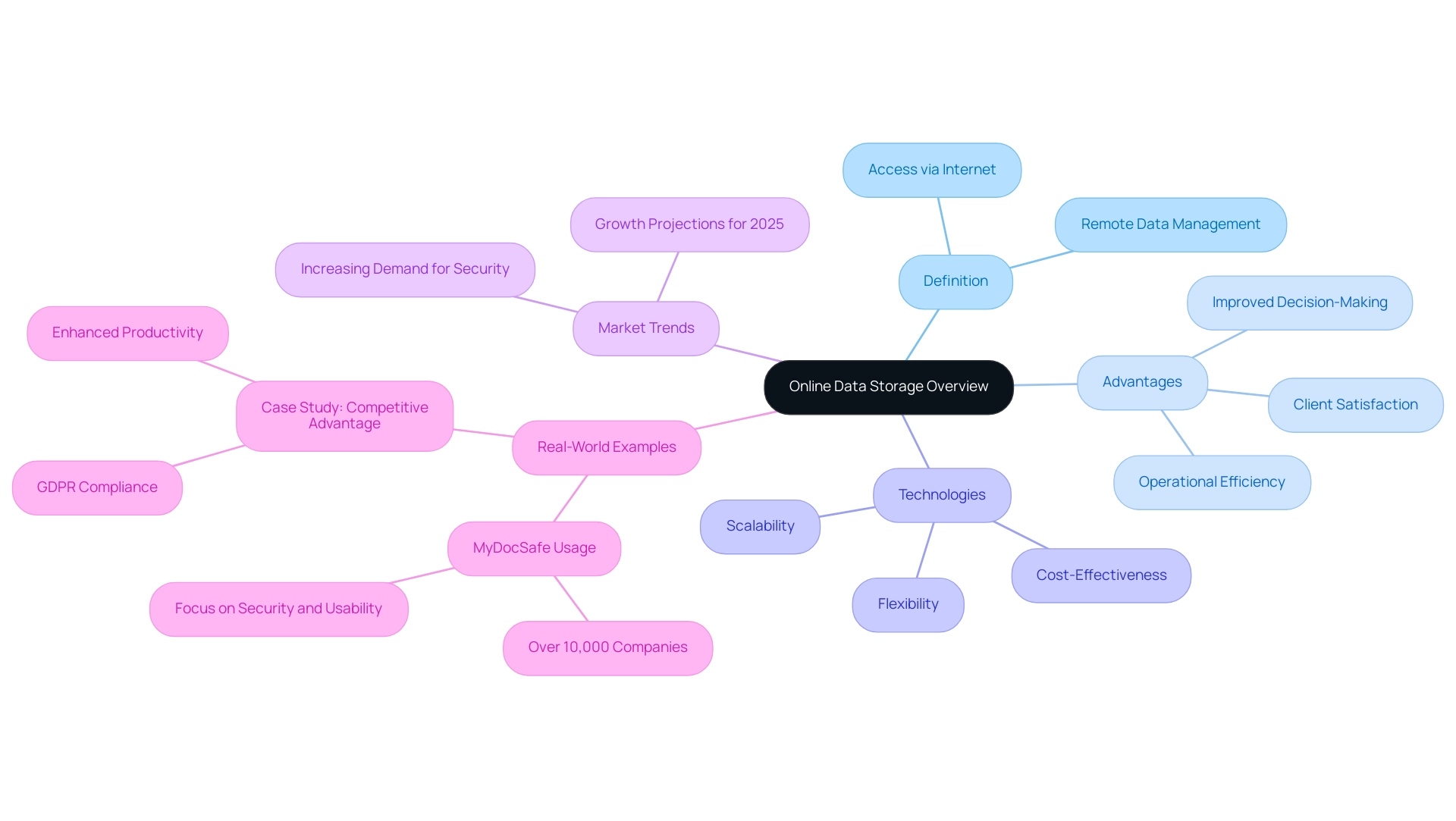
Types of Online Data Storage: Cloud, Hybrid, and More
In 2025, businesses have access to a variety of online data storage solutions, each tailored to meet specific needs:
- Cloud Storage: This is the predominant choice for many organisations, where data is stored on remote servers managed by third-party providers such as Google Drive, Dropbox, and Amazon S3. This model promotes flexibility and collaboration by enabling users to access their files from any device with internet connectivity through online data storage.
- Hybrid Storage: This innovative model merges cloud and on-premises storage, enabling organisations to keep sensitive information locally while utilising the cloud for scalability and backup. This method not only improves information protection but also streamlines resource distribution, making it a favoured option among companies that need both control and adaptability.
- Private Cloud Storage: Created for one organisation, this choice provides exclusive resources, greatly improving protection and control over information management. It is particularly beneficial for industries that handle sensitive information, such as legal and healthcare sectors, where compliance with regulations is paramount.
- Public Cloud Storage: In this model, resources are shared among multiple users, which can lead to cost savings. However, it may provide less control over data protection, making it essential for businesses to evaluate their risk tolerance before choosing this solution.
Each kind of solution, including online data storage, offers unique benefits designed for various business needs. For example, hybrid models are gaining traction, with statistics indicating a notable rise in adoption rates as organisations seek to balance security and scalability. Expert insights indicate that the selection between cloud, hybrid, and private solutions for online data storage should be driven by particular operational needs and compliance requirements.
As the market evolves, understanding the distinctions between these storage types will empower businesses to make informed decisions that align with their strategic goals. With more than 10,000 firms already utilising the platform’s services, the focus on protection and adherence in information management is more essential than ever, especially in industries where information integrity is non-negotiable. The platform provides customisable data rooms specifically designed for M&A, insolvency, and real estate transactions, ensuring that sensitive documents are securely managed and shared with relevant stakeholders.
Furthermore, this platform offers features like client onboarding, ID verification services, and encrypted email, improving the overall protection and efficiency of document management. As Charles Griffiths, Director of Technology and Innovation, states, “Every business needs a robust cyber security strategy. Collaborate with our service to safeguard your valuable information, emphasising the importance of integrating strong cybersecurity measures into online data storage solutions.”
Moreover, the platform’s focus on user-friendliness and compliance with regulations like GDPR illustrates how these features are essential for industries handling sensitive information. To encourage potential users, MyDocSafe also offers a 30-day free trial, allowing businesses to experience its comprehensive document management and e-signature solutions firsthand. Furthermore, AWS’s recent investment in Australia, intended to support over 2,500 full-time jobs each year, highlights the changing environment of cloud services and its effects on companies evaluating information management choices.
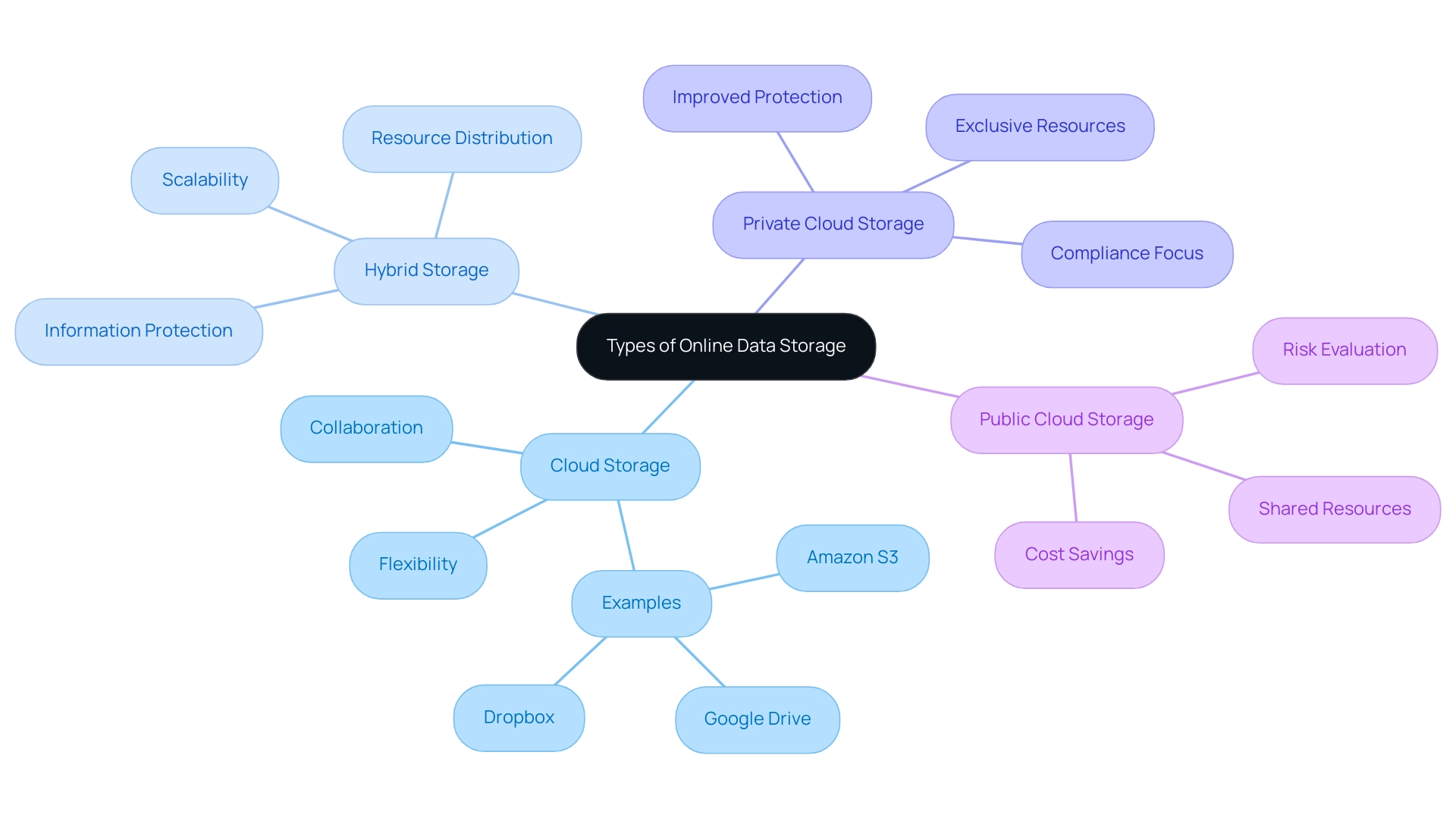
Key Benefits of Online Data Storage: Efficiency and Accessibility
The retention of information through online data storage presents a multitude of benefits that are becoming essential for contemporary enterprises, particularly in the context of remote work. Key benefits include:
- Accessibility: Users can access their data from any location and device, which is crucial for facilitating remote work and enhancing collaboration among teams. This flexibility is particularly significant, as 40% of remote workers report challenges in separating their personal and professional lives. Online information management solutions, such as those provided by MyDocSafe, can alleviate these challenges by offering a centralised platform for work-related documents, thereby helping to establish a clearer boundary between professional and personal life.
- Cost Efficiency: By eliminating the need for physical infrastructure, businesses can substantially reduce overhead costs associated with hardware maintenance and upgrades. In 2025, organisations utilising online data storage solutions are projected to experience considerable cost savings, enabling them to allocate resources more effectively. The advanced verification e-signature software further streamlines this process, minimising administrative delays and enhancing overall efficiency through customisable workflows and a paperless quoting process.
- Scalability: Online solutions allow organisations to easily adjust their capacity based on demand, ensuring they only pay for what they utilise. This adaptability is particularly advantageous in a rapidly evolving business environment, complemented by customisable workflows that enhance this scalability.
- Data Backup and Recovery: Numerous online data storage solutions come equipped with automated backup features, mitigating the risk of data loss due to hardware failures or disasters. The system guarantees that all sensitive documents are securely stored and regularly backed up with legally compliant practices, which is essential for maintaining business continuity and protecting sensitive information.
Online data storage fosters collaboration by enabling multiple users to access and edit documents simultaneously, thereby promoting teamwork and productivity. The platform enhances this collaboration with encrypted document sharing and advanced e-signature capabilities, ensuring that all interactions are secure and efficient. The service employs top-level encryption standards utilised by financial institutions, providing an additional layer of security for sensitive documents. As illustrated by the case study of Pumble, effective communication tools are vital for enhancing remote work experiences. Pumble centralises communication and provides necessary resources, significantly improving overall productivity for teams.
In 2025, the integration of online information retention is anticipated to further optimise operations, with specialists underscoring its importance in enhancing efficiency and accessibility. Business leaders acknowledge that the cost efficiency of these solutions not only supports operational needs but also contributes to a healthier work-life balance for employees, who save an average of 72 minutes in commute time each day. This extra time can be redirected towards utilising online data storage solutions, emphasising the significance of these tools in today’s business environment.
As Raisa Yogiaman, a content marketer, aptly stated, “Knowing the inevitability of breaches gives us the perfect opportunity to prepare, if we have the will – and strategy – oh, and tools – to do it.” This underscores the importance of possessing the appropriate tools, such as comprehensive document management and e-signature solutions, to ensure information security and efficiency. Furthermore, the adaptability and compensation are key drivers for job-hopping among Millennials and Gen Z, highlighting the importance of work-life balance in the discourse surrounding online information management in a remote work setting.
To experience these benefits firsthand, consider starting a 30-day free trial with MyDocSafe.
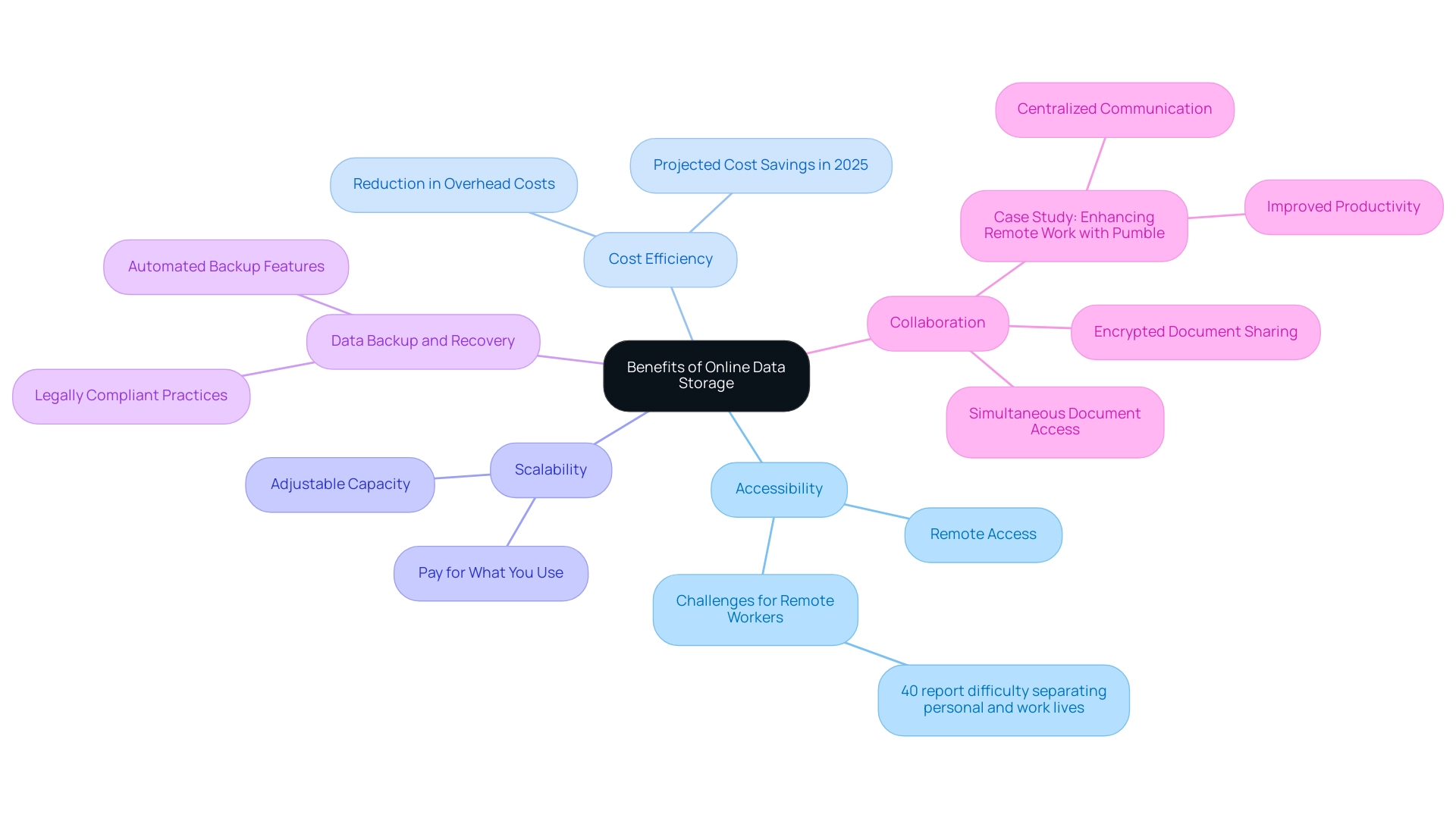
Security Considerations in Online Data Storage: Protecting Your Data
Security remains a paramount concern for users of online data storage solutions, particularly in the legal sector where compliance and confidentiality are critical. Key considerations include:
- Data Encryption: Protecting data through encryption both in transit and at rest is essential to safeguard against unauthorized access. MyDocSafe employs advanced encryption standards, blockchain solutions using Ethereum, and digital signatures to ensure that sensitive documents are secure. In 2025, the emphasis on information encryption will be critical, as statistics indicate that incidents of exfiltration have doubled since 2019, highlighting the need for robust encryption practices.
- Access Controls: Implementing stringent access controls and user authentication measures is vital for preventing data breaches. MyDocSafe provides various protective measures, including document passwords, SMS codes, and Knowledge-Based Authentication, to enhance user verification. Recent predictions suggest that by 2025, a significant percentage of companies will adopt access control measures, with 48% already implementing aspects of the Zero Trust framework, which fundamentally rejects the notion of inherent trust in network protection. The Zero Trust approach is increasingly being adopted in cloud environments, influencing cloud strategies for many organisations.
- Regular Audits: Conducting regular assessments is crucial for identifying vulnerabilities and ensuring compliance with industry regulations. The organisation’s commitment to security includes proactive measures that not only enhance safety but also align with best practices in information management, as outlined in the security overview and encryption standards.
- Backup Solutions: Utilising reliable backup solutions can significantly mitigate the risk of information loss due to cyberattacks or system failures. The service offers comprehensive document management solutions that include backup strategies, ensuring that critical information is protected against evolving cyber threats.
- Choosing Reputable Providers: Selecting a trusted cloud service provider with a proven safety track record is essential for safeguarding sensitive information. The platform showcases a dedication to information protection and adherence to regulations like GDPR. As Tara Kachaturoff, a user of MyDocSafe, noted, “Its ease of use for managing client contracts” highlights the significance of protection in document management solutions.
As cybersecurity specialists highlight, the significance of encryption in online data storage is crucial and cannot be overstated. With 80% of enterprises contemplating or implementing zero trust strategies, the environment of information protection is rapidly changing, making it essential for organisations to remain proactive against possible threats. Furthermore, forecasts for 2025 encompass next-gen awareness programmes and protection against deepfakes in cyber attacks, further emphasising the need for organisations to adapt to emerging threats.

Challenges and Risks of Online Data Storage: What to Watch Out For
While online data storage offers numerous advantages, it also presents significant challenges and risks that organisations must navigate, particularly in the context of security and compliance.
- Data Breaches: Cybersecurity threats remain a pressing concern, with a staggering 63% of applications exhibiting first-party code flaws and 70% showing vulnerabilities in third-party code, as highlighted in recent cybersecurity reports. These flaws can result in unauthorised access to sensitive information, making strong protective measures essential. The platform addresses these concerns with comprehensive security protocols, including key management and a Data Processing Agreement, designed to protect sensitive information.
- Downtime: Dependence on internet connectivity means that outages can severely disrupt access to essential information. Businesses have reported substantial revenue losses due to downtime, emphasising the need for reliable service providers and contingency plans. The platform ensures high availability and reliability, minimising the risk of downtime for its users.
- Compliance Issues: Organisations must ensure that their data storage practices align with relevant regulations, such as GDPR and HIPAA. Non-compliance can result in hefty fines and reputational damage, making it crucial to stay informed about evolving legal requirements. The platform’s framework for secure document management includes adherence to GDPR, ensuring that clients remain compliant while managing their documents. Additionally, the service’s Terms of Service and Acceptable Use Policy provide clear guidelines for maintaining compliance.
- Vendor Lock-In: Transitioning between providers can be complex and costly, often leading to vendor lock-in situations. This can limit flexibility and hinder an organisation’s ability to adapt to changing needs or technologies. The service provides flexible solutions that allow for easier transitions and adaptability.
- Cost Overruns: Without effective management, expenses related to online data storage can increase unexpectedly, especially as capacity requirements expand. Organisations must implement strategic budgeting and monitoring to avoid financial pitfalls. MyDocSafe provides transparent pricing and scalable solutions to help organisations manage their costs effectively.
The landscape of online information storage is evolving, with a notable 92% spike in cyberattacks reported against educational institutions in 2023, underscoring the urgency for enhanced security measures. This trend highlights the broader challenges organisations encounter in safeguarding their information. As the cybersecurity market is expected to reach $212 billion by the end of 2025, organisations must prioritise their information protection strategies.
Expert insights indicate that companies should not just ‘check the box’ on compliance but actively participate in grasping the complex risks linked with online information management. Jacob Fox, Search Engine Optimisation Manager, emphasises this point: “Don’t just ‘check the box’. Learn 7 factors that will ensure your next pentest is a strategic advantage for your business.”
The FBI’s report of a 10% increase in cyberattack complaints in 2023, along with a 22% rise in losses, further illustrates the critical need for vigilance and proactive measures in protecting information, a commitment that the company embodies through its comprehensive security and compliance frameworks, including the legal validity of e-signatures.
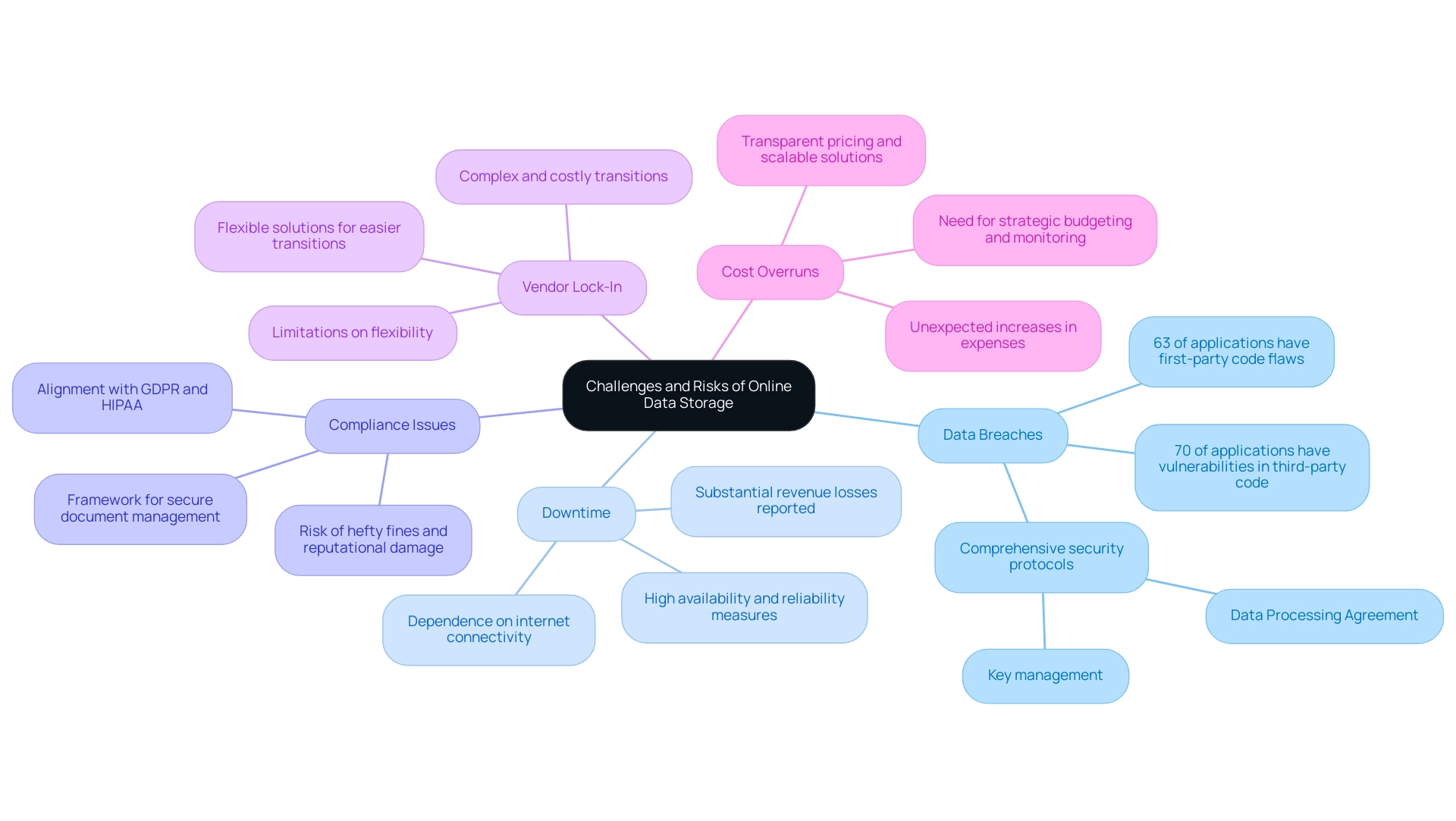
Best Practices for Effective Online Data Storage Management
To effectively manage online data storage, organisations should adopt the following best practices:
- Regularly Review Storage Needs: Conduct periodic assessments of your storage requirements to avoid unnecessary expenses associated with unused space. This proactive approach ensures that resources are allocated efficiently. With over 10,000 companies worldwide utilising MyDocSafe’s services, it is evident that effective storage management is a recognised industry standard.
- Implement Governance Policies: Establish comprehensive governance policies that outline clear protocols for management, including retention schedules and deletion processes. This is crucial for maintaining compliance with regulations and ensuring sovereignty, which is increasingly important in today’s regulatory landscape. As information sovereignty becomes a focal point, organisations must prioritise clear governance protocols to control access and comply with regulations.
- Utilise Automation Tools: Leverage automation tools, such as those provided by this service, to streamline backups and information organisation. MyDocSafe’s automated AML/KYC checks and document management capabilities significantly enhance operational efficiency while reducing the risk of human error, which can lead to breaches or loss. According to Krishna Subramanian, co-founder and COO of Komprise, “Automated workflow orchestration tools will be important for efficiently managing these tasks across petabyte-scale information estates.”
- Educate Employees: Invest in training programmes that emphasise information protection and best practices. Ensuring that all team members comprehend their roles in safeguarding sensitive information is essential for maintaining a secure information environment. The effect of employee training on information security is significant, as informed employees are less likely to fall victim to phishing attacks or mishandle information.
- Monitor Usage and Costs: Regularly track capacity usage and associated expenses to identify trends and make informed adjustments to your information management strategies. This practice helps organisations enhance their solutions for keeping resources and manage expenses effectively. Recent advancements in NAS appliances, created to support both file and object management, emphasise the significance of adjusting to modern trends in information solutions.
By applying these optimal methods, businesses can enhance their online data storage for better information management, ensuring both efficiency and security in an increasingly intricate digital environment. Furthermore, as synthetic information becomes more prevalent, it will drive AI-powered consumer insights, highlighting the significance of effective governance policies in real-world applications.
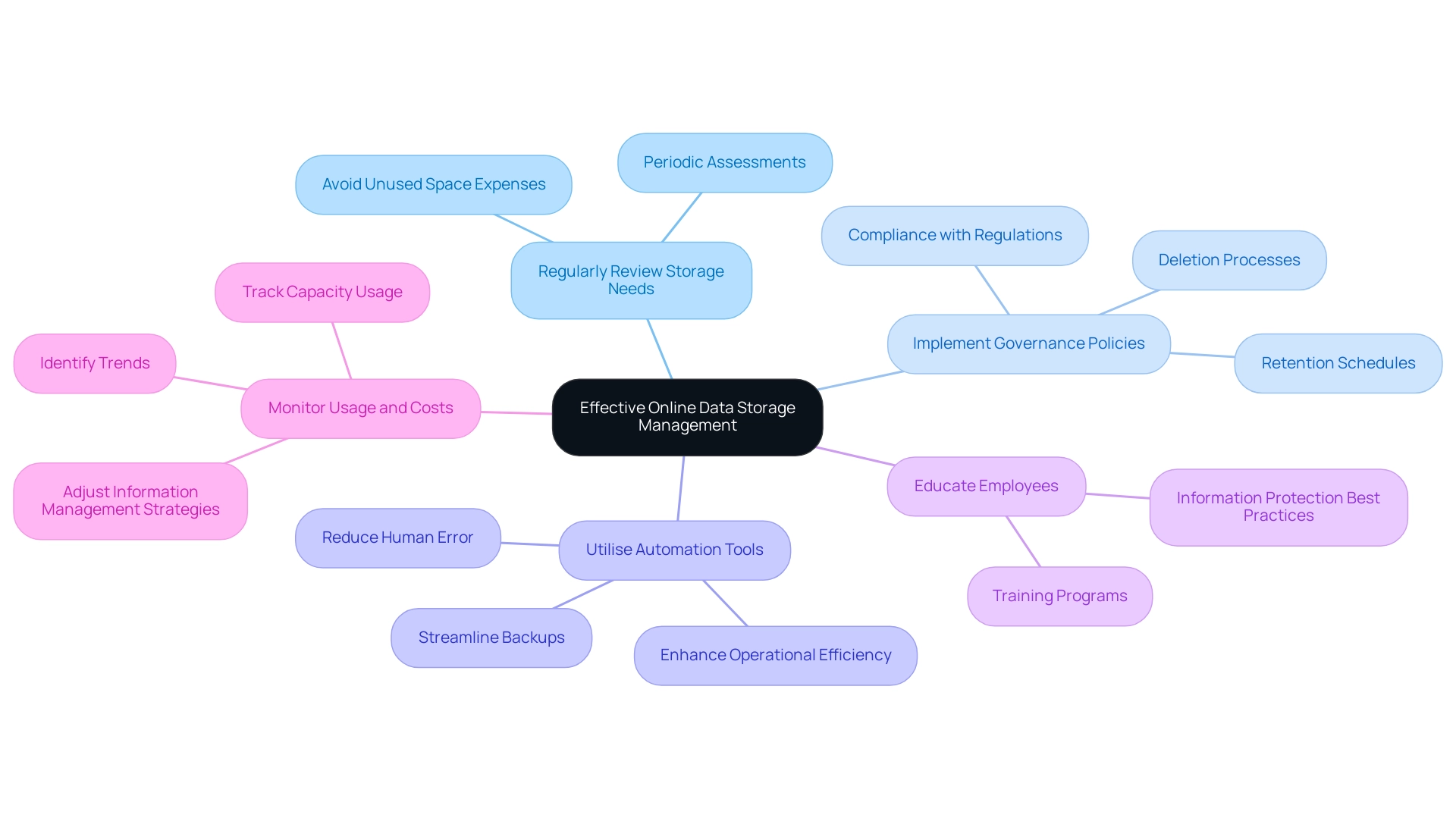
Future Trends in Online Data Storage: What Lies Ahead
The future of online data storage is poised for transformative changes, propelled by several pivotal trends:
- AI Integration: Artificial intelligence is set to revolutionise data management, delivering smarter storage solutions and facilitating predictive analytics that can foresee storage needs and optimise resource allocation. By 2025, a remarkable 91% of companies are projected to invest in AI initiatives related to data management, with 92% reporting measurable business benefits from these investments.
- Enhanced Attention to Protection: As cyber threats grow increasingly sophisticated, organisations will prioritise advanced protective measures, including the adoption of zero-trust architectures. This shift is imperative, as 14% of businesses cite geopolitical uncertainty as a challenge, emphasising the need for robust security frameworks. Moreover, 81% of business leaders view investment in digital transformation as a critical or necessary component for achieving success in their organisations.
- Sustainability Initiatives: There is a rising focus on eco-friendly solutions for data retention, with companies increasingly striving to reduce their carbon footprint. This trend aligns with broader environmental, social, and governance (ESG) objectives, as organisations seek to harmonise operational efficiency with sustainability.
- Edge Computing: The advent of edge computing will facilitate more decentralised retention solutions, enhancing access speeds and minimising latency. This transition is anticipated to improve user experiences and operational efficiencies across various sectors.
- Information Privacy Regulations: Ongoing modifications in privacy laws will compel organisations to adjust their retention practices to ensure compliance. As regulations evolve, businesses must remain vigilant in updating their information management strategies to align with legal requirements.
These trends underscore the intricate landscape of online data storage and preservation, where AI integration and sustainability are at the forefront of innovation. As organisations navigate these changes, they must confront challenges identified by IT decision-makers, such as cyber threats and skills shortages, as illustrated in the case study “Barriers to Progress in Digital Transformation.” This study highlights the obstacles organisations must surmount to effectively implement digital transformation strategies.
Furthermore, the remarkable growth of 29.7% in the IaaS market globally in 2022 reflects the escalating demand for online data storage solutions and the competitive landscape involving major providers like Amazon and Microsoft.
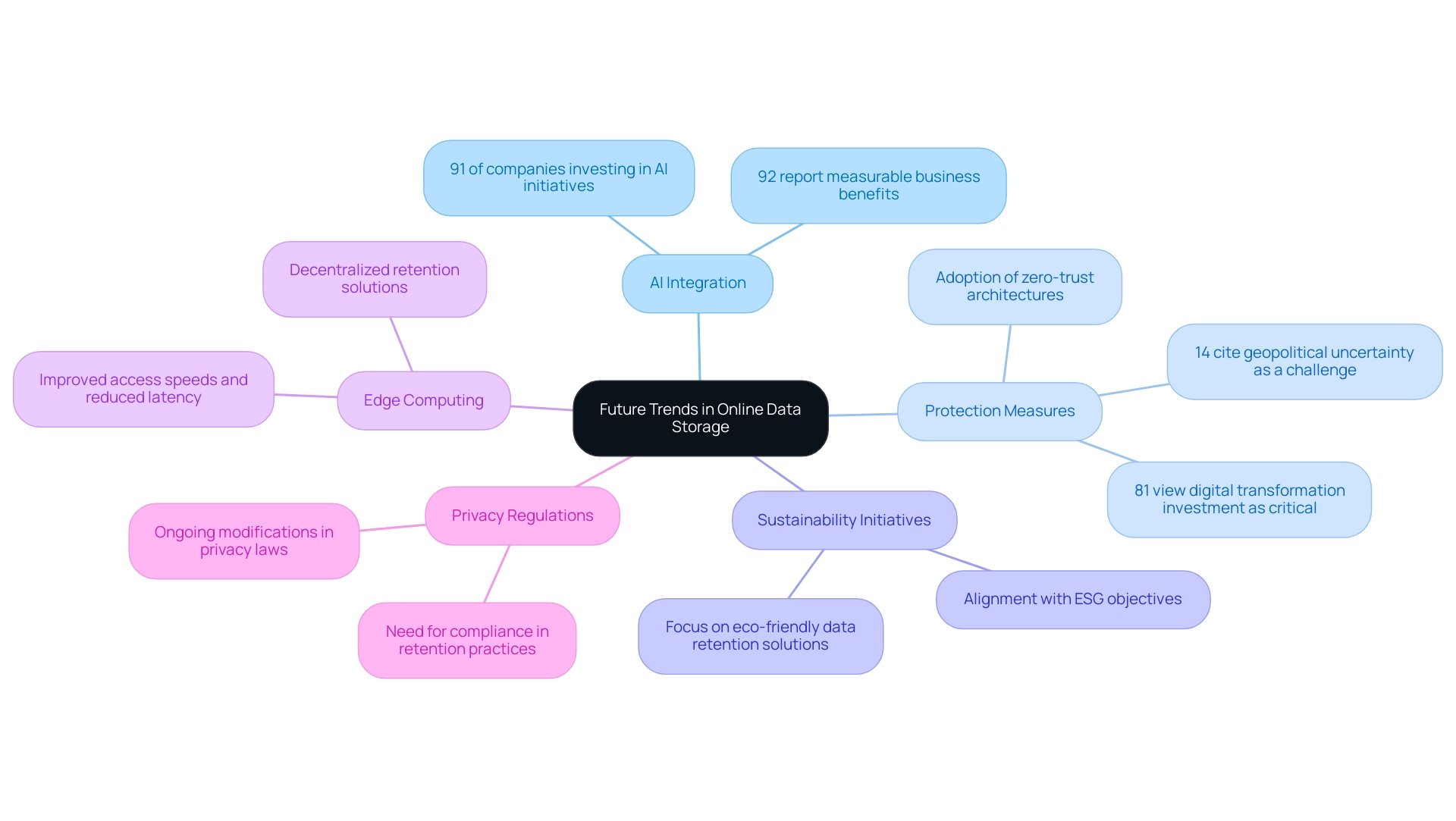
Conclusion
The exploration of online data storage unveils a landscape abundant with opportunities and challenges for modern businesses. As organisations increasingly rely on digital solutions, they are gravitating towards diverse storage models—cloud, hybrid, private, and public—to address their unique requirements. Each option presents distinct advantages that enhance operational efficiency, facilitate collaboration, and improve data accessibility, which are crucial in today’s remote work environment.
Nevertheless, the benefits of online data storage are accompanied by significant security and compliance risks that demand careful management. Data breaches, downtime, and compliance issues can jeopardise the very advantages these storage solutions offer. Therefore, implementing robust security measures—including encryption, access controls, and regular audits—is essential for safeguarding sensitive information and ensuring compliance with regulations like GDPR.
Looking to the future, online data storage is set for transformation through trends such as AI integration, enhanced security protocols, sustainability initiatives, and evolving data privacy regulations. These developments will not only redefine the storage solutions of tomorrow but also compel organisations to remain agile and proactive in their data management strategies.
In conclusion, online data storage transcends mere technological choice; it is a strategic imperative for businesses striving to thrive in a data-driven world. By leveraging appropriate solutions and adhering to best practices in security and compliance, organisations can harness the full potential of their data while navigating the complexities of the digital landscape. As the demand for effective data management escalates, investing in reliable and secure online storage solutions will be pivotal for achieving long-term success and sustaining a competitive edge.



